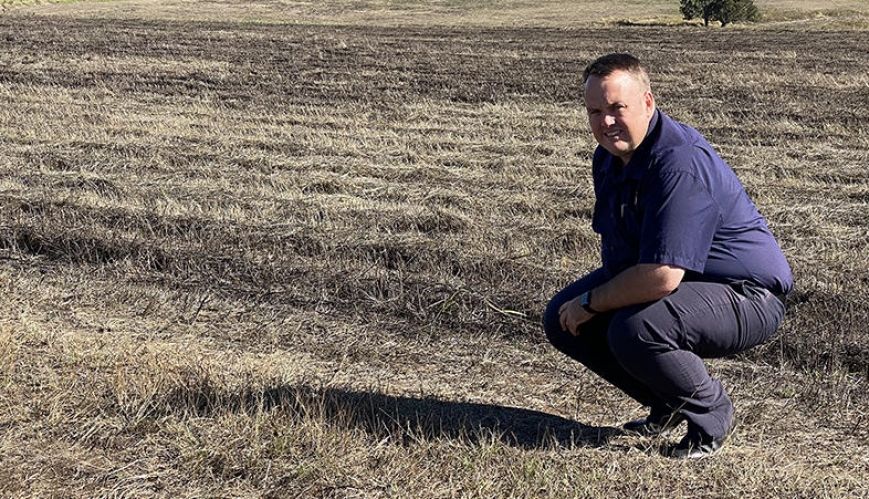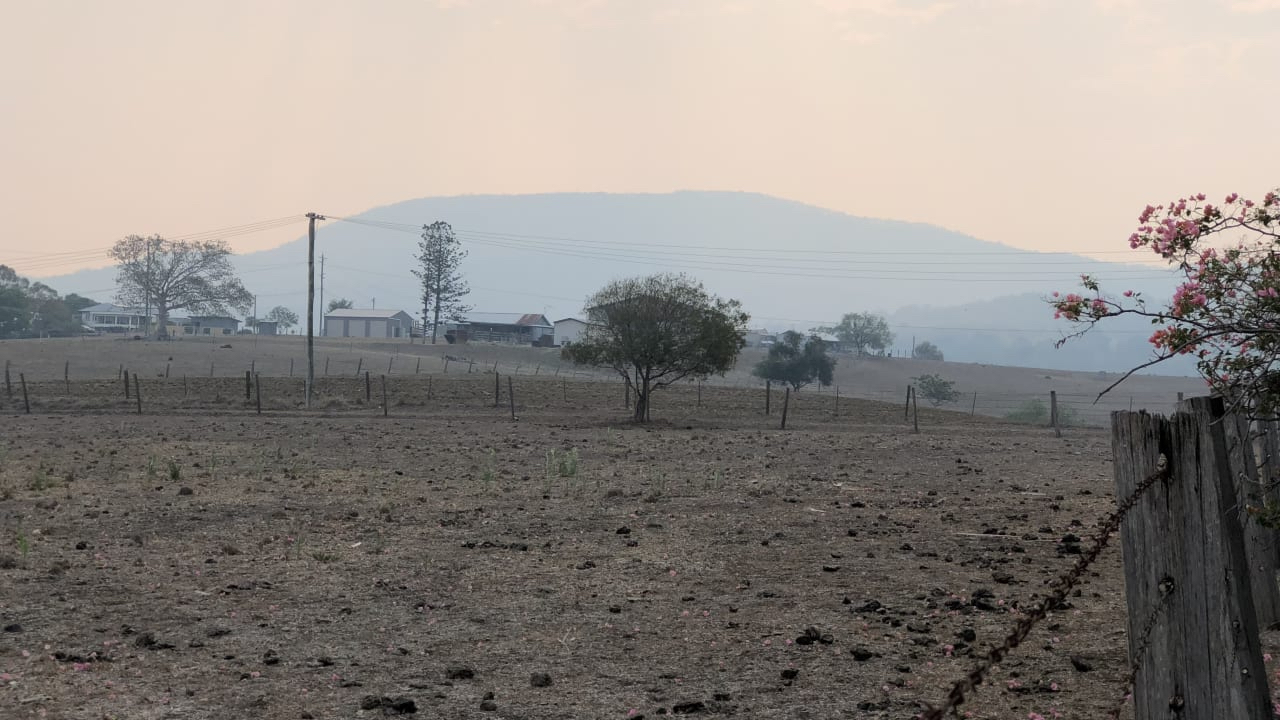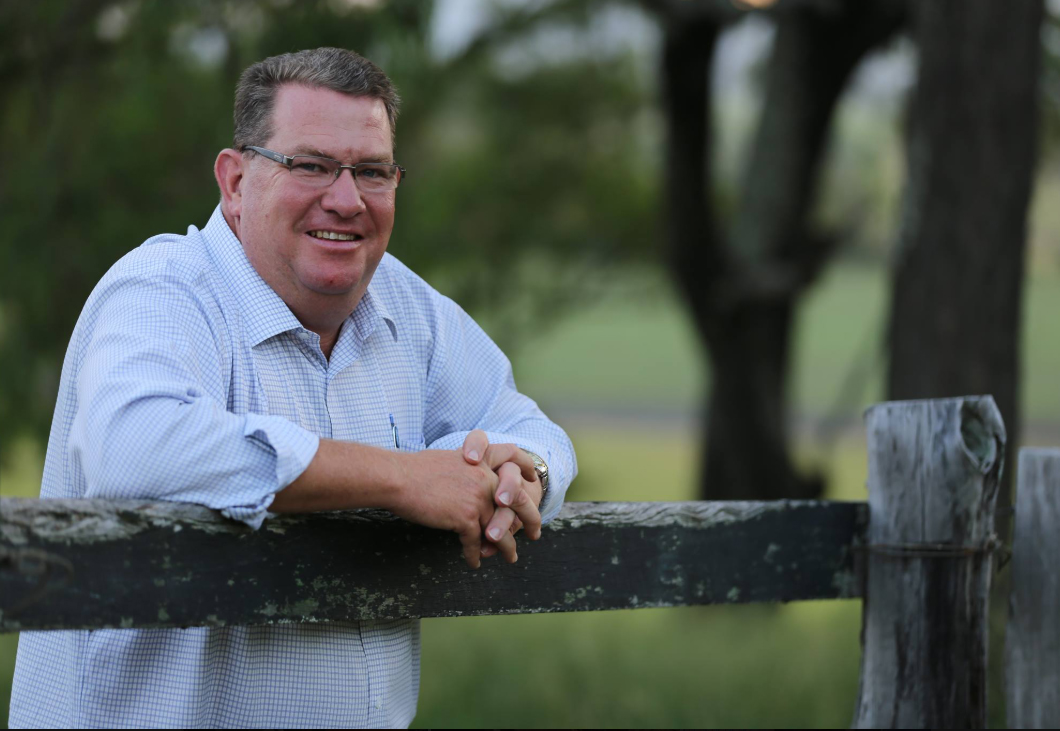Scenic Rim farmers thank God for the Salvos

Scenic Rim farmers thank God for the Salvos
Captain Wes Bust speaks on the Fassifern Corps Facebook page about drought assistance for Scenic Rim farmers. Background photograph by Brian Thomas courtesy of The Beaudesert Times newspaper. Artwork by Darryl Whitecross.
While Australia’s focus in recent times has been on recovery from the ‘Black Summer’ bushfires and the battle against COVID-19, what has almost been forgotten is that farmers are still struggling with drought in many parts of the country.
The Salvation Army has not forgotten these people and is working hard to bring whatever relief it can to households, businesses and farms where the drought is still having a crippling impact.
Denise Thomas, the Army’s program coordinator for the Federal Government Drought Community Support Initiative (DCSI), said about 90 per cent of Australia was still “drought-declared”. It was 99 per cent in January.
Salvationists are working tirelessly to get assistance to those crying out for support – farmers, farmworkers, farm suppliers or contractors. One of these hardworking people is Fassifern Corps Officer Captain Wes Bust. Fassifern is located in the centre of the Scenic Rim in south-eastern Queensland [about 100km inland from the Gold Coast] and Wes said the area hadn’t seen rain since 255mm [10 inches on the old scale] fell in January/February: “We’ve had 3mm since then,” he said.
Wes has been one of many Salvation Army workers processing applications for DCSI grants up to $3000. Denise said if it wasn’t for Wes’ advocacy on behalf of the people in the Scenic Rim, they may not have received any funding to get back on their feet.
 A parched property in the Scenic Rim of Queensland at the height of the drought. Photo courtesy of the Fassifern Guardian
A parched property in the Scenic Rim of Queensland at the height of the drought. Photo courtesy of the Fassifern Guardian
Denise said the Scenic Rim missed out on the first wave of funding. “Wes consistently advocated for his community, stating they were in severe drought and in desperate need of drought assistance,” she said. “Due to Wes’ advocacy and highlighting the issues in his ‘patch’, the DCSI team was able to advocate successfully to the government to include Scenic Rim as an eligible LGA (Local Government Area).”
Since then, $800,000 had been distributed across the region to about 270 farmers. Government figures indicate that more than $4.5 million in DCSI funds have so far been given out to more than 16,000 drought-affected households.
Denise said The Salvation Army had handed out about $8 million from its own resources, mostly across New South Wales and Queensland.
“Wes is a credit to The Salvation Army and an amazing representative of what The Salvation Army is all about,” Denise said, adding that some applications had been allocated to Wes from the online and telephone applications but he had generated some himself “from his knowledge of the community and his contact with key stakeholders”.
The eligible applicants could use the one-off DCSI payment buy groceries or spend on vehicle maintenance, energy and utility bills or health and medical expenses.
Wes said the Scenic Rim community was not angry it had been overlooked with the initial round of funding. He said they shrugged their collective shoulders and “just got on with it”, although they were much happier the money was available now.
“You can't be worrying about what could have been – you’ve just got to get on with it to get the job done,” he said. “The consistent feedback is that it’s ‘come at the right time’ or ‘this is just been such a blessing to us’.
“The farmers out here very resilient people but (the relief funding) has far-reaching impacts into our community. It helps not just the farmer, the farm supply businesses or the grocery store or the pharmacy, they pay the council rates or they go and buy those ‘big-ticket items’ like a new pump.
“The great thing about the DCSI is that the funding comes back into our local community. It’s a real shot in our arm in what has been very difficult times.”
 Federal Member for Wright, Scott Buchholtz is also “doing all he can” to assist farmers in his electorate.
Federal Member for Wright, Scott Buchholtz is also “doing all he can” to assist farmers in his electorate.
Recipients ‘overwhelmed’
As well as actively seeking out eligible households and promoting DCSI to other professionals, Wes maintains contact with local MPs and posts video on social media promoting DCSI and offering personally to assist eligible community members.
Wes praised the work of the Federal Member for Wright, Scott Buchholtz, who had been “doing all he can” to ensure the struggling farm community in his electorate “are advocated for in the Federal Government space”.
Denise said many of the people the Army has contacted were “overwhelmed” at being called with the offer of assistance as they were not aware they were eligible for funding. “Some have been in tears on hearing they were eligible,” she said. “One person said they had an eviction notice as they had not been able to pay their rates. Another had $30 in the bank and was going through a tough time personally and another said The Salvation Army seems to contact him just when he needs it most.”
Wes said he had spoken with a farmer who had infrastructure in place for irrigation but could not afford a pump to power it. “I asked how much was the new pump and they said it was nearly $3000 and I said: ‘Well, if you’re eligible (for DCSI assistance), that’s what we're going to be able to give to you and they were quite moved by that.”
As well as the rural chaplains working hard in the DCSI space, court and prison chaplains who have not been able go into the courts and prisons due to COVID-19 have been assisting with the completion of drought assessments.
Making connections
Wes said that, with the spread of the COVID-19 virus and the unknown space around social distancing, it was “just nice” to be able to still connect with the community over the phone.
“It’s just another way to connect with our community and to let the community know that they're not doing it on their own; that we’re in their corner and we’re cheering them on,” he said. “What they’re also getting is a local who is prepared to take the time to listen. What I wanted to do was to provide a local touch so that it wasn't just money getting handed out but it was the local Salvos connecting with our community.”
Is he still receiving applications for funding? “I have another 15 on my desk today and three farmers have rung while we’ve been speaking.”
“I’m hoping to get through as many as physically possible before the funding agreement runs out. The last indication I received was that (DCSI) funding concludes on June 30, which gives me a sense of urgency that, three weeks today, it’s all over so I just try to get through as many (applications) as I possibly can when I can.”
The Scenic Rim is considered the carrot capital of Australia. There is also grazing, dairy, mixed crops, honey production and organic growers – on significant properties as well as the boutique farms.
Wes said he was not “a country boy”, having grown up in Toowoomba (on the edge of the Scenic Rim) but he admitted he’d “learnt lots in three years”.
“Some of the farmers have said they have spent an extraordinary amount of money on power to irrigate per year. Others have spent money on feed that most people wouldn’t even earn in a year trying to keep cattle alive and the so it's just been a bit humbling to be able to hear their stories and to let them know that, at the end of the conversation, they’ve been heard they’ve been known and they’ve been noticed,” Wes said.